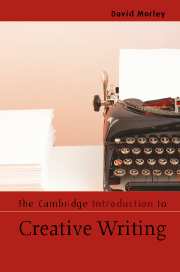Book contents
- Frontmatter
- Contents
- Preface
- Acknowledgements
- Chapter 1 Introducing creative writing
- Chapter 2 Creative writing in the world
- Chapter 3 Challenges of creative writing
- Chapter 4 Composition and creative writing
- Chapter 5 Processes of creative writing
- Chapter 6 The practice of fiction
- Chapter 7 Creative nonfiction
- Chapter 8 Writing poetry
- Chapter 9 Performing writing
- Chapter 10 Writing in the community and academy
- Illustrative bibliography
- Index
Chapter 9 - Performing writing
Published online by Cambridge University Press: 05 June 2012
- Frontmatter
- Contents
- Preface
- Acknowledgements
- Chapter 1 Introducing creative writing
- Chapter 2 Creative writing in the world
- Chapter 3 Challenges of creative writing
- Chapter 4 Composition and creative writing
- Chapter 5 Processes of creative writing
- Chapter 6 The practice of fiction
- Chapter 7 Creative nonfiction
- Chapter 8 Writing poetry
- Chapter 9 Performing writing
- Chapter 10 Writing in the community and academy
- Illustrative bibliography
- Index
Summary
I found that it was quite a lot easier than I'd thought to get into the magic anthill – the place where people other than yourself might think you were a writer … There was … a coffee-house called The Bohemian Embassy, situated in a falling-apart factory building, where poets congregated once a week to read their poems out loud … It was, I found, quite different from acting. Other people's words were a screen, a disguise, but to get up and read my own words – such an exposed position, such possibilities for making an idiot of yourself – this made me sick … How would you ever know whether you'd made the grade or not, and what was the grade anyway?
margaret atwood, Negotiating with the Dead: A Writer on Writing (2002: 21)All writing is performance. Style performs our voice. Our syntax and diction perform language. As we have discussed, the first pleasure of creative writing resides in process. However, a book once published ceases to captivate its maker in the same way: the covers shrink around it making it seem a closed space. The writer wants rid of something with which they have become over-familiar. They wish to move on to another open space, another book usually. Yet, in its composition, the book was performed in the present; it was improvised on to a page after practice. Performance offers another chance to visit that improvised moment.
- Type
- Chapter
- Information
- The Cambridge Introduction to Creative Writing , pp. 215 - 233Publisher: Cambridge University PressPrint publication year: 2007



